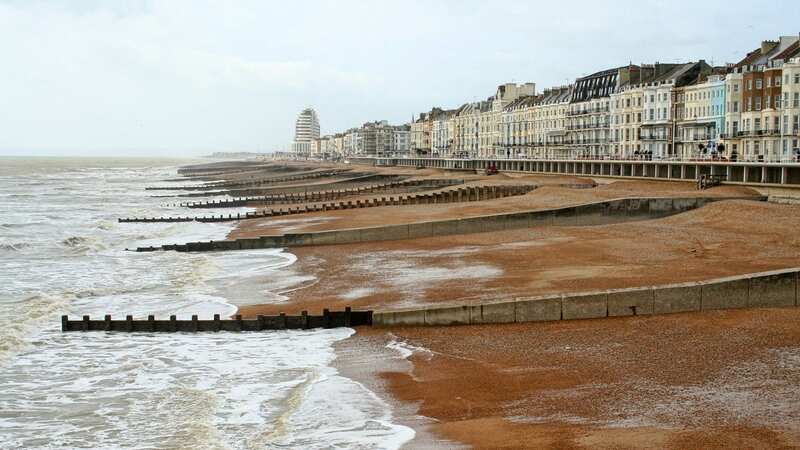UK town could go bankrupt as hundreds of families in need of accommodation

The council of British seaside resort could be at risk of bankruptcy as hundreds of families have been left in need of temporary accommodation, according to reports.
More than 500 households in Hastings, East Sussex, cannot afford a home and there are fears the situation could push the local council into bankruptcy. This financial year, Hastings Borough Council will spend £5.6million housing families in need this year - a quarter of its entire budget.
House prices in Hastings have almost doubled over the past decade and private rents have gone up too. The Local Housing Allowance, which is the maximum amount of housing benefit tenants can receive, has been frozen by ministers since 2020.
Chris Hancock, the director of housing at the council, told BBC News: "We didn't have a single two-bedroom flat advertised at local housing allowance rates last year. There is a strong risk this could bankrupt the council. We cannot make our budget stack up if we continue to have to spend this amount of money on temporary accommodation."
Barista Keira Boorman, 19, said she has been living in a one-bedroom flat since her 19-month-old daughter was born, and added there is not enough space for the two of them. The mum said that despite working at The Grumpy Cook in Hastings, she cannot save enough for a two-bedroom flat, which would cost around £950 a month.
 London flat for rent for £1,400 a month with bed tucked away in kitchen cupboard
London flat for rent for £1,400 a month with bed tucked away in kitchen cupboard
Barry Ashley, owner of cafe in Hastings, said the issue of accommodation is close to his heart as half of his eight staff are in temporary accommodation. In the evening, the 60-year-old prepares meals for families who do not have cooking facilities in their rooms.
He said: "It breaks my heart to see the conditions they're living in. It's really heartbreaking." According to figures released by the Department for Levelling Up, Housing and Communities last week, councils in England spent at least £2.4billion tackling homelessness last year - and of that figure, £1.7billion was used to pay for temporary accommodation. The data also showed that overall spending increased by 10.5 per cent since 2021/11 and the biggest increase in costs was in Liverpool.
A council spokesperson said: "Current financial forecasts is a challenging one, councillors and officers are working tirelessly to ensure that the council does not find itself in a position where it faces a section 114. We are confident that with the measures being put into place, and the tough decisions being made over the coming year, we will be able to balance the budget.
"We are working closely with DLUCH and Homes England to bring more social housing on stream, and we have introduced measures such as buying property for temporary accommodation and hiring more housing officers to deal with the backlog. In 2019 we were spending £730,000 on temporary accommodation. In 2022/23 we spent £4.5million, with a forecast of £5.6million for 2023/24.
"We are working to reduce the numbers of people in temporary accommodation in several ways, and these numbers are falling. In 2010/11 the council’s net budget was £22.9m. By 2022/23 this had fallen by 28% to £16.5m. During this period direct government support (grants) has reduced from £15.9m in 2010/11 to £1.5m in 2022/23, a reduction of more than 90%.
"Over the last 13 years we have made prudent budget cuts to ensure we stay afloat, and we will continue to do so. To help us address the forecast deficit we are bringing forward our budget discussions and consultation to November so we can maximise any savings identified. We have also introduced restrictions on spend for non-essentials for the rest of this financial year."
Over the summer, we reported that the number of homeless households in temporary accommodation in England reached the highest level since records began 25 years ago. In a grim milestone, Government figures published in July showed 104,510 households, including 64,940 with children, were living in such conditions.
They include over 13,000 forced to live in B&Bs, 5,890 in hostels and 25,750 in nightly paid privately managed accommodation. The total figure of those living in temporary accommodation between January and March 2023 - 104,510 - is a 10% hike on the same period last year. It is also the highest number since the Government records began in 1998.
Matt Downie, the Chief Executive at Crisis, said: "Once again, we see the crippling cost that years of no investment in housing benefit, and a shameful lack of social house building, is having by trapping families in temporary accommodation. Not only do people not have the stability and security of a home, but they’re often left to cope in just one room, with no facilities to cook meals or do washing."
Read more similar news:
Comments:
comments powered by Disqus
































